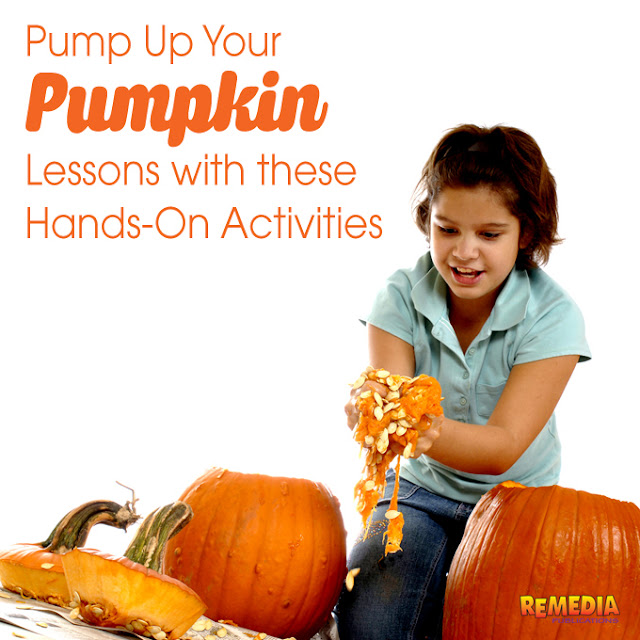5 Non-Reading, Inference Activities
Making inferences means using facts and reasoning to come to a decision or an opinion about something. Doing this involves an abstract level of thinking and can, therefore, be a complicated skill to teach, especially to students who struggle with reading. With practice though, students can become comfortable with the skill before having to tackle the concept while reading. These five activities will give your students a chance to practice making inferences without reading.
Pump Up Your Pumpkin Lessons this October
October is a great time to make this super-fruit the center of your lessons on observation, measurement, problem solving, seeds and growth, and more. For these activities, you will need one to two large pumpkins. Let's start by introducing students to the pumpkin with their senses.
Sensory Boxes
You will need:
Touch – Cut a hand-sized hole in this box. Have the children put their hands in the box and feel the slimy/wet seeds
Sound – No holes necessary on this box. Tape the lid onto this box extra tight. Instruct the students to rattle and shake the box.
Taste – Add cooked or store-bought seeds to this box. Cut a hand-sized hole in the box. Blind fold students and hand them a pumpkin seed to eat (know your students’ allergies before allowing them to participate in this box).
Sight – for a unique and fun challenge, skip sight. Students will all get to use sight in the next activity.
You will need:
- Fresh/raw pumpkin seeds
- Cooked or store-bought pumpkin seeds
- 4 shoe boxes with lids or empty tissue boxes
- Scissors (to cut holes in boxes, not necessary if you use tissue boxes)
- Tape (to keeps lids closed, not necessary if you use tissue boxes)
- Blind fold or bandanna
- Put fresh/raw pumpkin seeds in 3 of the 4 boxes and label them:
Touch – Cut a hand-sized hole in this box. Have the children put their hands in the box and feel the slimy/wet seeds
Sound – No holes necessary on this box. Tape the lid onto this box extra tight. Instruct the students to rattle and shake the box.
Taste – Add cooked or store-bought seeds to this box. Cut a hand-sized hole in the box. Blind fold students and hand them a pumpkin seed to eat (know your students’ allergies before allowing them to participate in this box).
Sight – for a unique and fun challenge, skip sight. Students will all get to use sight in the next activity.
Game-Winning Ideas for Teaching Through Sports
We've got a game-plan to win over your students’ attention! Dive headfirst into a sports themed lesson plan with these game-winning ideas!
Geography
Give each student a blank U.S. map <free download>. Have students use an Atlas to locate their favorite team’s home city and state. Have students mark their blank map with a star on the home city. Then each week students keep track of where their team is playing by finding the city in an atlas, and then marking their map. Have students answer these questions based on each week’s traveling: Which direction did the team travel? How many miles did they travel from the last city they were in? How many states did the team travel through to get where they are? How many miles from home is the team? You can even introduce time zones and weather/climate changes.
Language
Have you ever realized how many of our everyday terms and sayings come from sports? Introduce students to sports idioms like: ballpark estimate, behind the eight ball, first out of the gate, come out of left field, dive headfirst, game-plan, get the ball rolling, and many more! Have students familiarize themselves with these by drawing a picture of the idioms, defining the idioms, and using the idioms in a sentence.
Vocabulary
Make your spelling list sports themed with words like champion, arena, compete, coarse, fitness, performance, or opponent. Challenge students to see how many times they can find and highlight these words in a sports magazine or newspaper. Have students write a news article about their favorite team using as many of the sports-themed spelling words as possible or use these spelling activities <free download>. We also have a Sports Vocabulary activity book that is packed with over 50 pages of reproducible worksheets all about, you guessed it, sports vocabulary!
Reading
Extra! Extra! Read all about it! Pick up the Sports section of your local newspaper and get your students reading about their favorite athletes and teams. When students are more interested in what they are reading, they are sure to stick with it! Try this worksheet of questions students can answer after they read <free download>. Or grab one of Remedia’s high-interest, low readability activity books that focus on sports and famous athletes (click here to view).
Math Sports and math go hand-in-hand. From simple addition to physics and geometry, no matter your students’ math level you have an opportunity to introduce a math concept through sports! We recommend using Teaching Math Through Sports - high-interest, real-world math activities, templates, and lessons featuring hockey, baseball, basketball, skateboarding, the Olympics, and more!
Geography
Give each student a blank U.S. map <free download>. Have students use an Atlas to locate their favorite team’s home city and state. Have students mark their blank map with a star on the home city. Then each week students keep track of where their team is playing by finding the city in an atlas, and then marking their map. Have students answer these questions based on each week’s traveling: Which direction did the team travel? How many miles did they travel from the last city they were in? How many states did the team travel through to get where they are? How many miles from home is the team? You can even introduce time zones and weather/climate changes.
Language
Have you ever realized how many of our everyday terms and sayings come from sports? Introduce students to sports idioms like: ballpark estimate, behind the eight ball, first out of the gate, come out of left field, dive headfirst, game-plan, get the ball rolling, and many more! Have students familiarize themselves with these by drawing a picture of the idioms, defining the idioms, and using the idioms in a sentence.
Vocabulary
Make your spelling list sports themed with words like champion, arena, compete, coarse, fitness, performance, or opponent. Challenge students to see how many times they can find and highlight these words in a sports magazine or newspaper. Have students write a news article about their favorite team using as many of the sports-themed spelling words as possible or use these spelling activities <free download>. We also have a Sports Vocabulary activity book that is packed with over 50 pages of reproducible worksheets all about, you guessed it, sports vocabulary!
Reading
Extra! Extra! Read all about it! Pick up the Sports section of your local newspaper and get your students reading about their favorite athletes and teams. When students are more interested in what they are reading, they are sure to stick with it! Try this worksheet of questions students can answer after they read <free download>. Or grab one of Remedia’s high-interest, low readability activity books that focus on sports and famous athletes (click here to view).
Math Sports and math go hand-in-hand. From simple addition to physics and geometry, no matter your students’ math level you have an opportunity to introduce a math concept through sports! We recommend using Teaching Math Through Sports - high-interest, real-world math activities, templates, and lessons featuring hockey, baseball, basketball, skateboarding, the Olympics, and more!
7 Tips for Managing Restless Students

-
Students are more alert in the morning and may be more tired and rowdy in the afternoon. Plan your activities accordingly. Knock out your seat work and circle time in the morning when students will be more likely to stay focused.
-
Even adults struggle to pay attention for long periods of time. Give students short mental breaks during long seat work activities. Take short breaks to discuss the activity, let students sharpen pencils, or use the restroom.
-
For the student with fidgety hands, try giving that student something small, soft, and quiet to hold onto. For instance a rolled up sock or stress ball.
-
Some learning disabilities may prevent students from being able to sit still and stay focused for very long. Give these students reasonable expectations. If you expect the class to sit still for 15 minutes, excuse that student after 10 minutes. Challenge the student to improve over time.
Subscribe to:
Posts (Atom)



